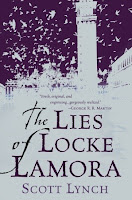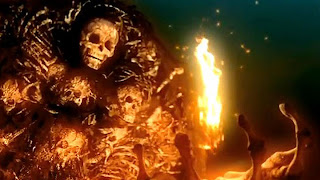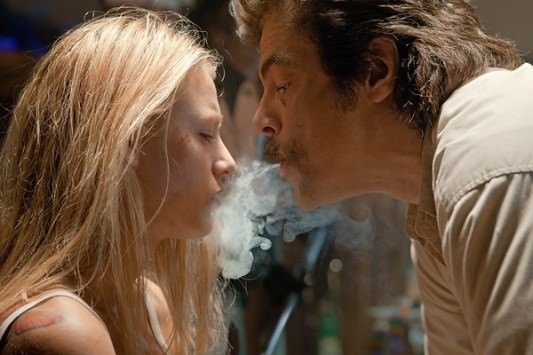"70 percent of all archaeology takes place in a library - research, and reading..."
I'm going to take a moment to talk about the Indiana Jones movies, and maybe not so much the movies themselves as to why I love the whole concept so damn much. One of the reasons I placed so much value into going to University when I was younger was because I loved Indiana Jones (guess who wanted to be an archaeologist/paleontologist when he grew up? C'mon, guess). So many action heroes are just thugs with biceps (especially nowadays) it's refreshing and a depressing rarity to find an action hero that isn't pandering to a big dumb audience - one that, in fact, has a doctorate and teaches at a small-time university. Neither was this small piece of characterization a gimmick (as any characterization so often is). Indiana's higher education lent him a certain worldliness and open-mindedness (alongside masculine heroics) that if there was any Hollywood action-oriented role model you may want your kids to emulate in the slightest, there are much worst out there.
Maybe I'm reaching here.
Thematically, the movies - the franchise - came out as pulp. It was, however, pulp of a very specific strain. There's tons of pulp; pulp fantasy (see Conan), pulp noire (see Sam Spade), pulp sci-fi (see Attack of the Fifty-Foot... whatever!), and Uma Thurman. Indiana Jones followed suit behind the kind of pulpy goodness shoveled into our faces by Doc Savage and Alan Quartermain and Benton Quest; deconstructed in The League of Extraordinary Gentlemen and satirized in The Venture Bros. Blending Archaeology with High Adventure and dungeon-crawling by replacing broadswords and shields with whips and revolvers. There was historical fictionalizing, set-pieces done up like real-world castles and ruins, and plots rooted into religion to ground them in our modern age. My principle issue with The Kingdom of the Crystal Skull (and don't expect a good, in-depth analysis) is that the whole fucking theme is wrong. We have a movie with an old Indiana in the 1950s, post-World War II, and the options of where the story could go are limitless with a little creativity. Sure, the Last Crusade should have (for all intents and purposes) been curtains to the series, what with the good doctor drinking from the Cup of Eternal Youth and riding off into the sunset with his father and friends (I'm sorry - you haven't seen the Indiana Jones movies? What is wrong with you?). But they're just movies, let's make another one and have some fun - that's what speculative fiction is all about, right?
I'm going to avoid analyzing, and I'm also going to avoid slinging more mud on the grave of George Lucas' credibility. Yes, the inclusion of aliens was his idea. Yes, most of his ideas are bad. Yes, the only reason he was thought to have good ideas is because technological limitations and studio interference tempered his creativity to a razor sharpness.
There was so much un-tapped potential in dealing with the Soviet Union and post-WW2 Indy and wealth of unexplored archaeological plot-devices. The Spear of Loginus, the Terracota warriors of Red China?
There a CGI fight scene for you, Lucas you fat assh-*
What about sets somewhere in friggin Russia or Instanbul, Islamic religious artefacts? What about Sputnik? That would be leaning dangerously close to the James Bond pulp, but still - what about Indiana Jones and the Infernal Machine?
What I'm getting at here is there's a difference between religion and folklore in the same way James Frazer illustrated there's a difference between magic, religion and science in the evolutionary cycle of human civilization. One is slightly more credible than the other, and religion is second only to science. Aliens and UFOs and friggin Roswell are American folklore, and the whole Mayan thing is too unpopular and bizarre and clumsy to work. This defeats two inherent and formulaic concepts integral to the Indiana franchise; its credibility and its exotic setting. The first seems kind of eye-brow raising, but if the good doctor's adventures can be treated as fiction-fantasy-whatever, they can certainly be treated as hard rather than soft - using actual historical reference material for their plots, actual cities and citing religious mythology as their plot devices. This in addition to Indiana's grit as a character (his non-superhero superheroism); in that he can be hurt, is fallible, makes mistakes, loses his temper; lend the series a benefit-of-the-doubt sort of credibility. Kingdom of the Crystal Skull with its lame UFOs and CGI monkeys becomes Yet Another National Treasure Movie.
To speak to the latter; crucial to the Jones story is an exotic setting in which it must take place. North America is boring. The world is so much more interesting. It's a childish message, sure, but it consistently got its point across in the old trilogy as the time spent on North American shores was more often than not limited to a few expository scenes. Bringing North American folklore into the plot deviates from the formula which is a crucial component of the franchise. Bringing politics to the mix also denigrates that flawless wordly character Indiana embodies. I loved Temple of Doom. I've been to the Third-World and I appreciated the depiction of the small village in fictional India (I emphasize the fictional country of India which exists for no other purposes than to have an adventure and is loosely based off the actual country of India**). I love the eyball soup scene - I love how Indiana so casually eats his meal and discusses politics with the Maharajah while Willie loses her mind in the culture shock and acts grossed out and immature; it adds to that intelligent worldliness I keep going on about. It's an exotic location!
Enough of Indiana Jones has seeped into, say, Dungeons & Dragons and the entire dungeon-crawling industry, too. The traps, the temples, the mine-cart rides...
I think the whole point of this article was so I could write about how much I love Indiana Jones. Seriously, read the quotes page at imdb and tell me that's not good writing.
*Lucas' original ideas for the Indiana Jones movies involved subterranean dinosaur Lost World and were so far removed from what clearly worked in Raiders it becomes questionable as to what point executives continued trusting him with script ideas
**The word "racist" is thrown around so much about shlock like Temple of Doom it gets on my nerves. Who is taking these movies so seriously? It's pulp fiction! If you find yourself under the impression that this is an accurate depiction of the Hindu people and that they eat monkey brains in India it's because you don't know any better, and you should.






























